Within 24 hours this past week, something aggravating and then something funny happened. First, the aggravation.
It started with the Sunday New York Times. (We get the paper delivered once a week.) My husband set aside this special section pullout for me to peruse:
Assembled by Well, the Times’ health and wellness department, the pullout aims to be a handy guide to cooking and eating the Mediterranean diet for a healthier life. Unless you have super keen vision, you’ll need help with the subtitle:
How the time-tested Mediterranean diet can offer real benefits, with recipes to help you get started.
I’m all for that, but got peevish upon reading page 2:
It’s aggravating to read again and again that the Mediterranean diet is the way to go for healthy habits. The implication is that something associated with the geography of Europe is the only thing we can turn to to save ourselves!
We all lead cross-cultural lives and we cook and eat that way too. The Diet has become a meme that smacks of cultural imperialism, reinforced by statements like this one in paragraph 2:
. . . And definitions of the diet have evolved over time, so we won’t limit ourselves to fare from the Mediterranean region.
Well crafted, that statement serves to permit including non-Mediterranean recipes, such as: huevos rancheros by Kay Chun, vegetable tortilla soup by Ham El-Waylly, maafe by Yewande Komolafe, mole verde by Jocelyn Ramirez, cashew, celery and tofu stir-fry by
, greens and beans by Rick Martinez, and cucumber salad with peanuts and chile oil by Sue Li.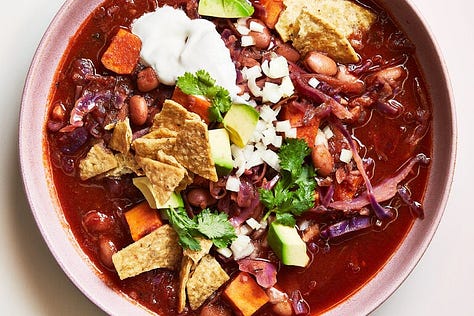
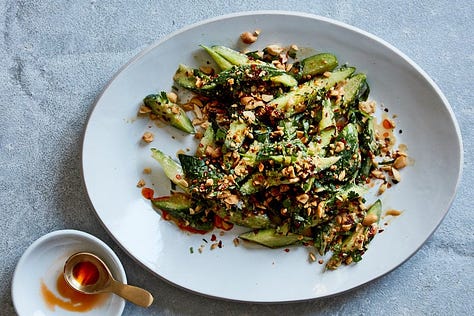
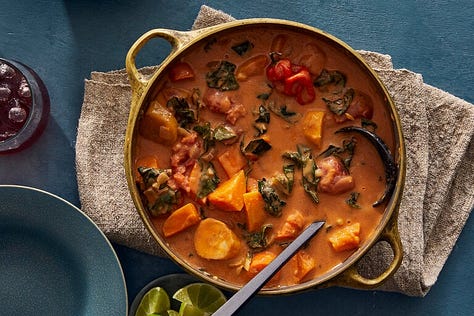
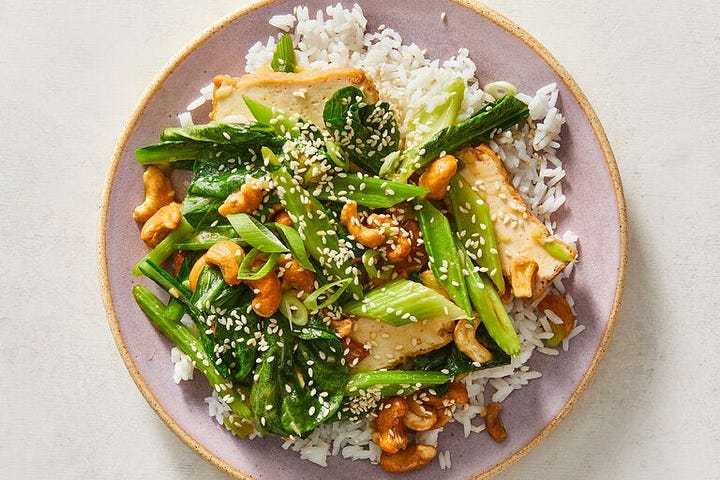
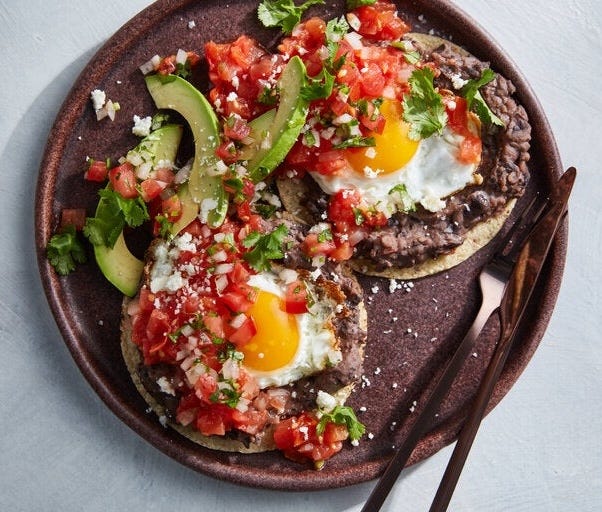
The full recipe listing is on page 3 in the table of contents:
I love inclusivity but why should the Mediterranean get all the credit when healthy food ideas come from all over the world? Moreover, those ideas, such as the handful of recipes that I pulled from Well’s special section, come from people of diverse heritages.
I got all riled up. Normally, I’m not one to stir the pot vigorously. My husband advised that I cool off.
The next morning in my Instagram feed, the first post was from Vietnamese-American artist Jeremy Nguyen. It was one of his recent New Yorker cartoons.
You can interpret the mischievous cartoon many ways, but it reminded me of why I started writing — I had something to say and cultural bridges to build. If I remained quiet and let the Mediterranean diet swallow up foods like tofu and avocados without respecting their place of origins (China and the Americas), I wouldn’t be doing my job.
The cultural takeover is strong. For example, this stock photo of a “Mediterranean diet” includes avocado, tomato, and what looks like a knob of ginger. And, is that turmeric in the lower left?
As the Time’s pullout section reminds us, the Mediterranean diet focuses on getting people to enjoy more:
Whole grains
Fruits and vegetables
Legumes/beans/lentils
Nuts and seeds
Healthy fats
Those five tenets serve as pillars of traditional diets all over the globe. Add to it low or no animal protein. The Blue Zone studies underscored that years ago. You can now watch a mini-series about them too. If you don’t have access to it, the YouTube video below summarizes things, with a mention of Singapore as a new Blue Zone.
A note on the video: A bit of the information is inaccurate (regular tofu isn’t fermented!) but the video offers a flexible, holistic approach to personalizing our healthy habits.
Aggressive Singapore-style government intervention isn’t likely to work in a country as big as the United States, but we do need flexible ideas and personal strategies to help us take control of our personal wellness.
We should learn from other cultures because they speak to our modern experiences, which is intersectional and cross-cultural. We should identify and respect what those cultures have to offer, not slide everything into a comfortable, digestible rubric.
Putting multiple cultures under one umbrella term might make it easy for people trying to figure things out. But as proven in agriculture, monoculture farming isn’t great for the soil. In other words, don’t put all your eggs in one basket!
Let’s come up with a broader, more descriptive term than “Mediterranean diet” which stems from studies conducted in the 1960s. Lots has happened in the past 60 years. It’s 2024 — time to make room at the healthy table for other cuisines.
I’d love to hear your thoughts!
What are your strategies for wholesome, healthy eating?
What can we call this healthy diet? How about the Wellness Diet? Healthspan Plan?
Should we drop the term “diet”? It’s become grim and sad, distanced from its ancient roots in the Latin diaeta (a prescribed way of life) and Greek diaita (a way of life, regimen, dwelling).
I look forward to your ideas.
Warmly,
Andrea





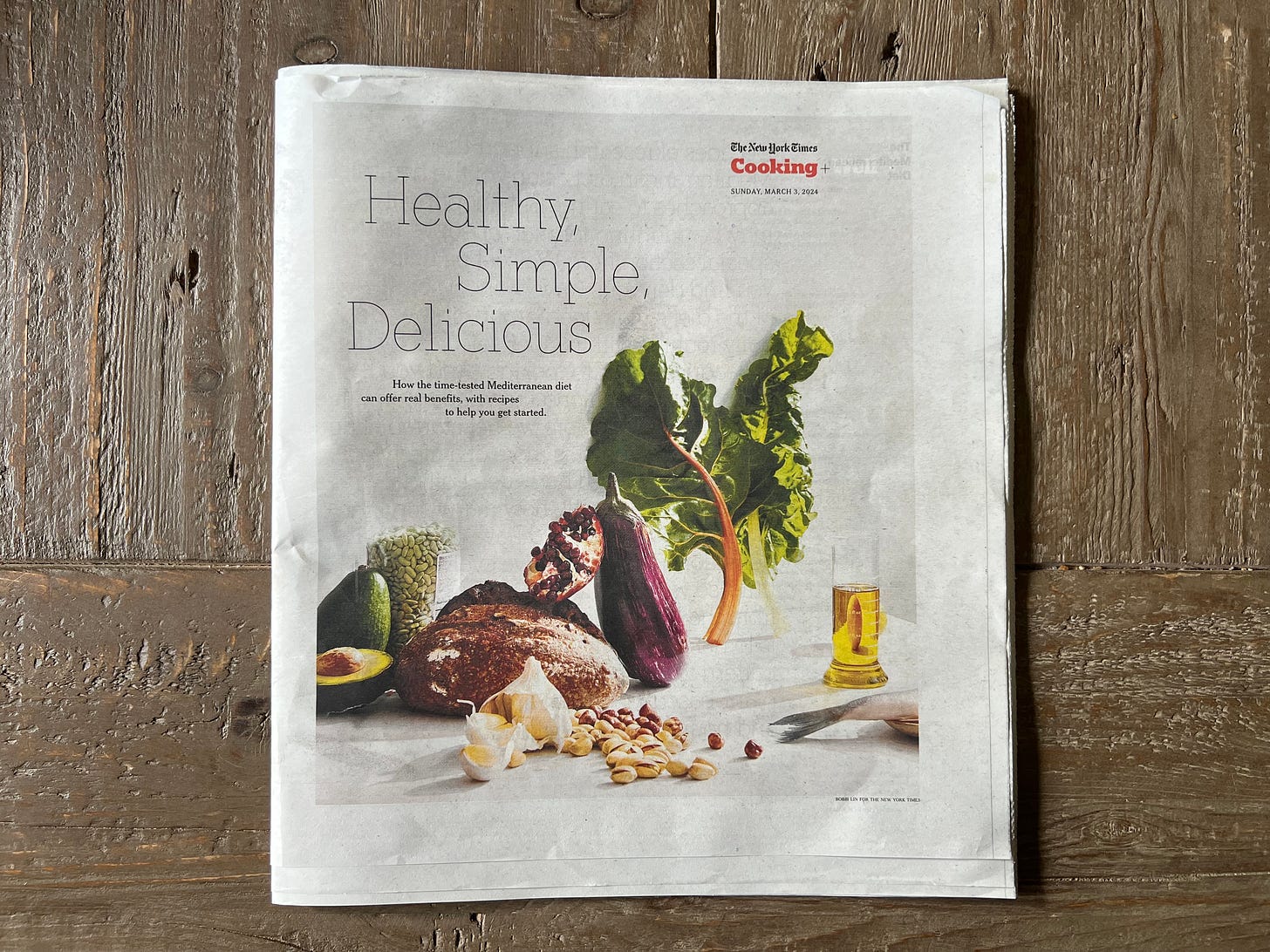
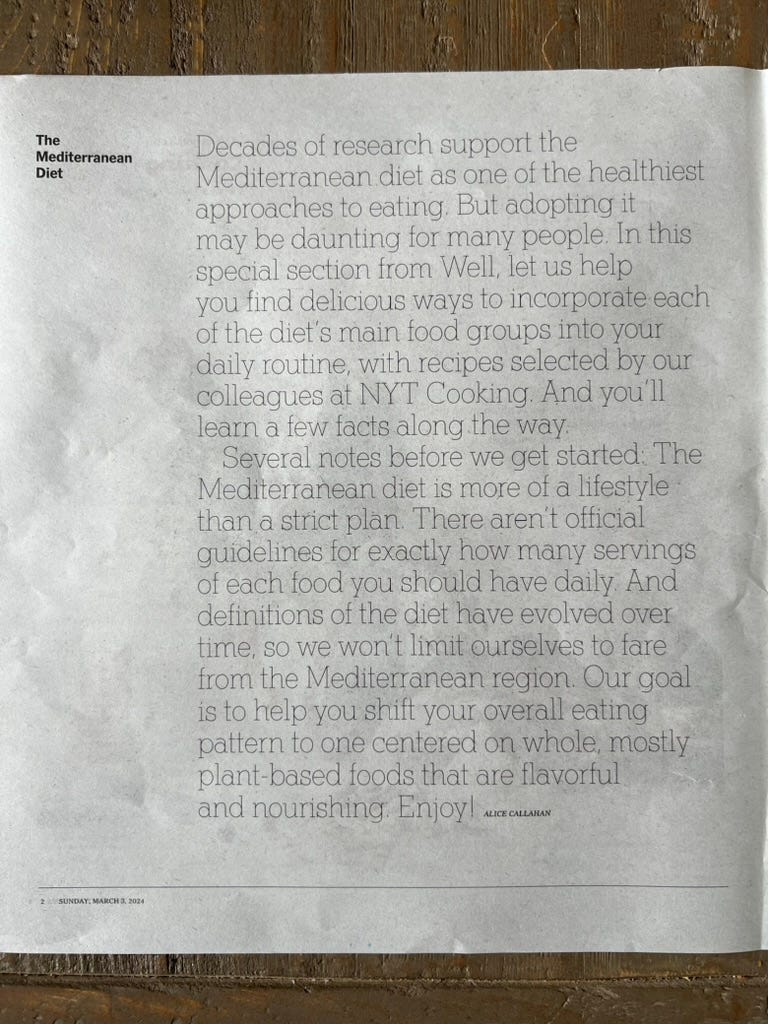
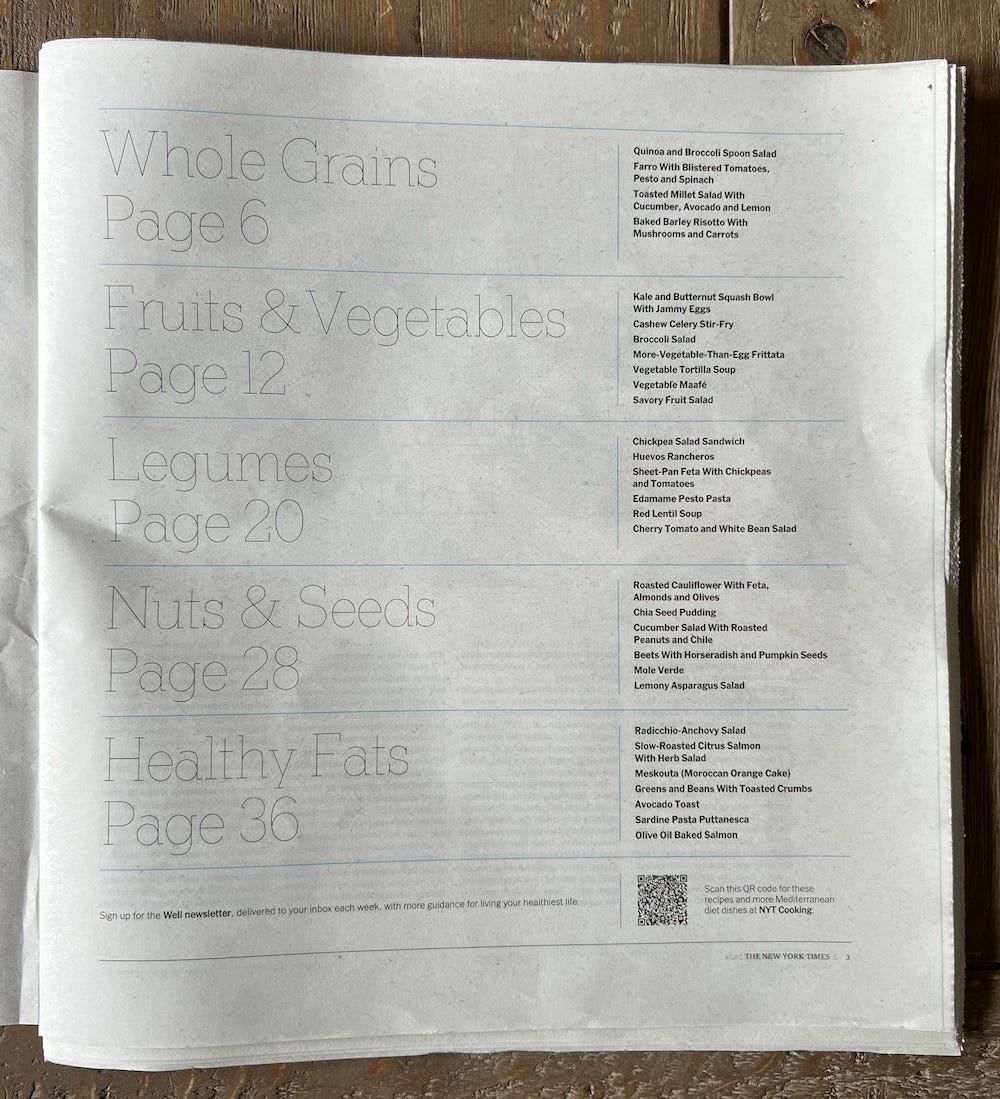
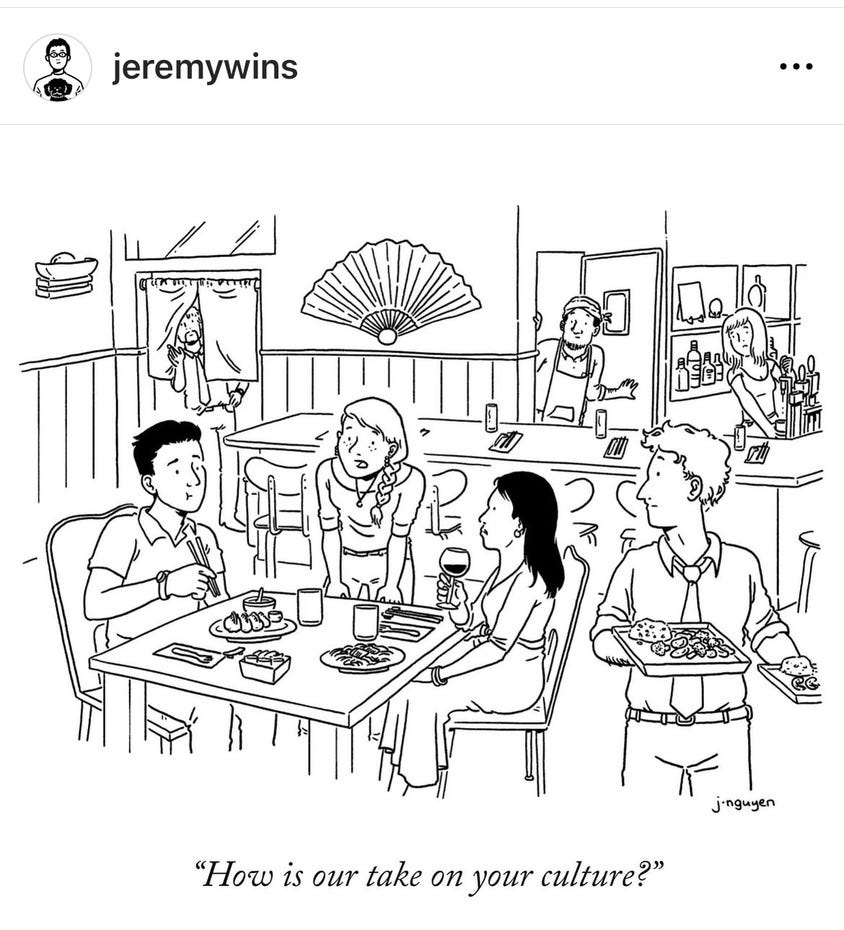
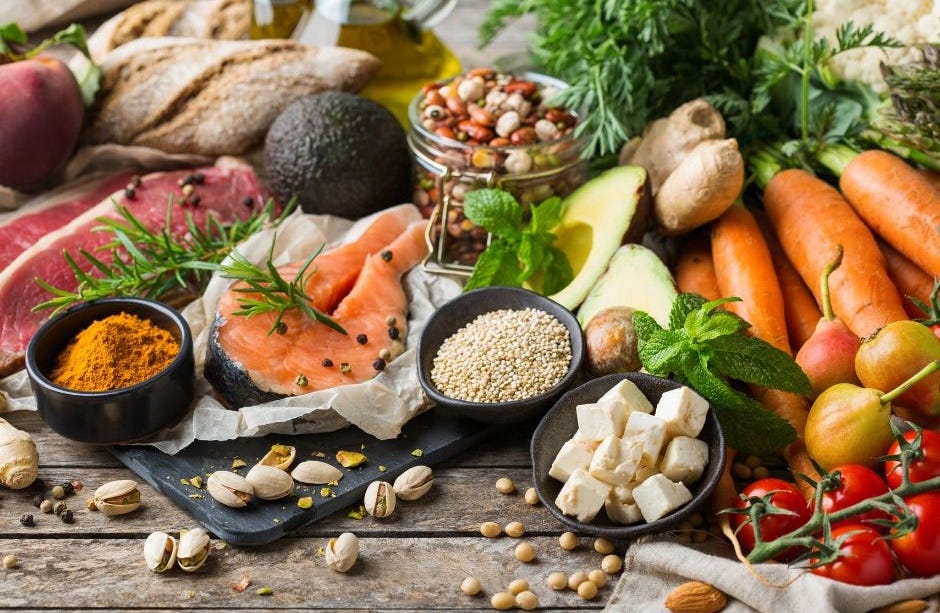
You are right to get all riled up! It is annoying, patronizing, and wrong. As you say well, it is perpetuating (western) cultural imperialism.
I also get the Times and fortunately didn't see this myself, which was a good thing. I would have pitched a fit over it. I feel far better in this venue where I can see how others most likely share my frustrations. I was raised on an American diet that incorporated much of the so called Mediterranean diet. I switched myself over to an Asian centered diet because they are the foods I love and enjoy making. I am sick and tired of how Western diets are seen as the most health promoting. I am also concerned over the Western influences I see on Asian diets. I was just telling a friend, that 30-40 years ago, I would walk down the aisle of an Asian market in NYC or Seattle or San Francisco, and there would be a little section (I mean tiny), devoted to Asian sweets. What was there depended upon what kind of Asian market it was (Chinese, Japanese, Korean, Viet, etc). Nowadays, I go into an Asian market and there is minimally one full aisle, possibly two, devoted to sweets (a few traditional and most western influenced). I am not against fusion, but I am not in favor of precious traditions lost to negative Western influence/impact. Getting back on topic--I completely agree that euro-centric perceptions of healthy foods and diets are not only narrow minded, they are also given credit for what is not their own.
And while I am on the subject, "diets" do not work. Lifestyle change that is focused on healthy and enjoyable eating does work. I recovered from several eating disorders myself and have successfully treated them for over 30 years. So forget diets. Improve what you eat, how you eat it, and why you eat it. :)